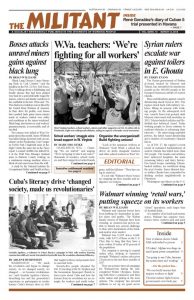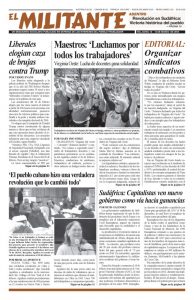The Syrian government of Bashar al-Assad, backed by Moscow and Tehran, has intensified its murderous assault on the 400,000 people in the besieged Damascus suburb of eastern Ghouta.
Mass mobilizations against Assad’s dictatorship shook Syria in 2011. The regime struck back with military violence, filling its prisons with working people. In the subsequent civil war, Assad’s forces lost ground, until Moscow intervened with airstrikes in 2015. Tehran-backed militias and Hezbollah also bolstered Assad. Today working people in Syria continue to confront obstacles to advancing their interests — the intervening capitalist powers, the hated Assad dictatorship and a number of reactionary Islamist forces.
As of Feb. 27, the regime’s recent round of sustained bombardment of eastern Ghouta has killed more than 500 people. The bombs and artillery have destroyed hospitals, the main remaining bakery and dairy factory. Pro-Assad troops, including Tehran-backed militias, are mobilized along the area’s border. Some Islamist forces within Ghouta have responded by shelling civilian neighborhoods in Damascus.
Washington and others on the U.N. Security Council secured Moscow’s backing for a cease-fire resolution over Ghouta by leaving the door open for continued assaults against “terrorists.” Bombing continued after the motion was adopted Feb. 24. Syria and its allied militias have massed troops for an assault.
This conflict is unfolding as opposing imperialist and capitalist powers position themselves to defend their interests in the region. The U.S. rulers and the Syrian Democratic Forces — the Kurdish-led force that is Washington’s “ally of convenience” — hold sway over 25 percent of Syria, including a large chunk of its oil resources.
Tehran’s counterrevolution
To maintain their counterrevolutionary course against working people at home, Iran’s capitalist rulers are driven to extend their influence across the region. In combination with its ally Hezbollah based in Lebanon, they have established military bases and weapons factories in Syria. The effects on working people in Iran from Tehran’s military intervention in Syria, Iraq and other parts of the Mideast provoked widespread working-class unrest in December and January.
Tel Aviv seeks to prevent Tehran from establishing a permanent Syrian presence, which it sees as an existential threat. Israeli Prime Minister Benjamin Netanyahu has met several times with Russian President Vladimir Putin to press Moscow to limit the presence of Iranian and Hezbollah forces near Israel’s borders. The Russian rulers want to preserve their growing influence in Syria, and maintain relations with Tel Aviv.
Moscow and Damascus both say the areas under control of the Syrian Democratic Forces should be returned to Assad’s control. This includes areas where Washington has bases and at least 2,000 troops.
The U.S. rulers are the dominant military power in the region, with tens of thousands of troops and massive air and naval power. They have no intention of relinquishing any part of Syria they control. Washington responded with massive firepower against an armed challenge by pro-Assad forces at Deir el-Zour Feb. 7. U.S. air and artillery strikes killed over 200 attackers and prevented them from retaking oil fields in the area.
Among the dead were Russian mercenaries. Moscow refuses to say how many were killed and sought to deny any government links, though they were trained on Moscow’s bases in Syria and survivors were airlifted to Moscow for medical care.
Deutsche Welle said the mercenaries were part of the Wagner group that fought alongside Russian-backed separatists who seized parts of eastern Ukraine after the popular Maidan uprising overthrew the Russian-backed regime of Viktor Yanukovych there.
Putin is wary that his government’s wars could become increasingly unpopular at home. Protests against Moscow’s assault on Ukrainian sovereignty took place in several Russian cities in 2014.
Ankara invades Afrin
The Turkish rulers have vowed to remove the Kurdish People’s Protection Units (YPG) from Afrin, a majority Kurdish canton separated from the larger Kurdish provinces to the east. They’ve threatened to extend their invasion to sweep Kurdish forces from the entire border with Turkey. Both Washington and Moscow acquiesced to Ankara’s assault on Afrin. Turkish army units and its allied Free Syrian Army forces, backed by Turkish warplanes, have made relatively slow progress since the invasion Jan. 20.
The YPG asked the Assad government to send its forces to Afrin. Assad sent militia forces, trained by Tehran to the province.
Ankara seeks to weaken the YPG in Syria as it also drives to deal blows to the Kurdish national struggle in Turkey. Backed by Washington, the rulers of Iran, Iraq, Syria and Turkey have denied the Kurdish people a homeland for decades. Kurds resist these assaults on their national rights.
But without a rise in broader struggles by working people Kurds have limited allies as they face the region’s rulers, who remain determined to push back the autonomous area that Kurds have carved out.
The YPG has begun transferring SDF combatants from Aleppo, Deir el-Zour and elsewhere to buttress its forces in Afrin. It has ceded control of Kurdish neighborhoods of Aleppo to the Assad regime.

